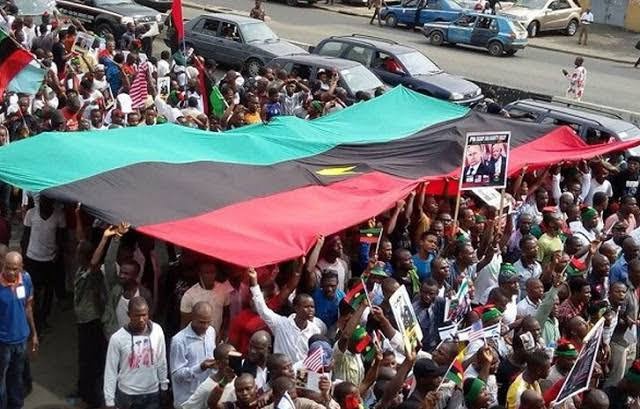IPOB Members Awaiting Outcome Of Kanu’s Trial Before Further Action, Sources Say
The arrest of the group’s founder, Nnamdi Kanu, has rattled many members of IPOB who are not sure what to make of the leadership vacuum. But there are those who insist it is business as usual for the secessionist group.

Members of the separatist group, Indigenous People of Biafra (IPOB), in Southeast Nigeria are waiting for the trial of their leader, Nnamdi Kanu, to commence fully before taking further action, HumAngle has learnt from sources within the group.
Kanu was originally arrested in Oct. 2015 and charged by the Department of State Services (DSS) with allegations bordering on terrorism, treasonable felony, managing an unlawful society, and publication of defamatory statements.
He was re-arrested on June 29 after he escaped bail and was deported to Nigeria from Kenya to stand trial. Binta Nyako, the trial judge at the Federal High Court, ordered Kanu’s detainment in the custody of the DSS during his first court appearance since 2017, when he absconded.
The judge allowed an accelerated hearing in the trial concerning treasonable felony allegations filed against him, and so moved the case from Oct. 20 to July 26 and 27.
HumAngle understands that Kanu’s arrest has rattled many IPOB members in the Southeast, who are not sure what to make of the leadership vacuum.
Kanu is believed to have transformed the organisation into a one-man show before his arrest, alienating some of his most devoted supporters. He had last Nov. sacked his deputy, Uche Mefor, and then scrapped the office. Sources told HumAngle that the highly centralised structure of the leadership is also reflected in how funds received by IPOB were managed.
According to an insider, the arrest was a huge surprise for the members. It left its people in the Southeast in “disarray,” and waiting for the unknown before taking the next line of action.
Increased military and intelligence operations targeting IPOB’s members, leading to the killing and detention of some, have also further destabilised the group.
Dissatisfied with the conditions that led to Kanu’s return to Nigeria and detention, some IPOB members who spoke to HumAngle on the condition of anonymity have begun to consider leaving the group.
Insiders also told journalists that if the trial results do not favour Kanu, riots may erupt, particularly in states where IPOB has a strong following.
One of them, who gave his first name as Uche, said: “ESN members are watching proceedings. We are not afraid of anything. If they want war, we give it to them. But if they want peace, we’re also ready.”
“As long as northerners are still standing with Pantami, Gumi, Miyetti Allah, etc, we will stand with Nnamdi Kanu who has not done anything wrong,” he maintained.
“Nnamdi Kanu is not the problem. He is just a product of it. Dead or alive, he has written his name in gold. His name will outlive him. Kanu is the most popular Igbo man alive today with a humongous following. Protests will be held about him across the globe. Embassies will discuss him. Whether you’re praising him or criticising him, the most important thing is that he is being discussed.”
Aloy Ejimakor, special counsel to Kanu, had disclosed that the detained IPOB leader was in high spirits at the DSS detention facility.
The lawyer also stated that before any court could subject Kanu to trial, it would first conduct a trial within a trial on the incident that forced Kanu to leave Nigeria and brought him back to the country.
“No court of law, conscience, and equity will overlook those two incidents and proceed to trial,” Ejimakor said.
IPOB’s armed wing, the Eastern Security Network (ESN), has been accused of killing at least 60 people in recent months, though the leader of the group denied the charges.
On Wednesday, July 21, an armed gang opened fire at a police checkpoint in Enugu State, killing two police officers and burning their vehicle.
Kanu rose to prominence in 2009, when he began broadcasting on the London-based Radio Biafra, popular among southeastern listeners.
He formed IPOB in 2012 and became popular in using social media platforms like Facebook and Twitter to spread his separatist messages in an attempt to secure Biafra’s independence from Nigeria.
In Sept. 2017, his organisation was declared a terrorist group by the Nigerian government, which accused it of orchestrating illegal activities, including attacks on state security formations.
Support Our Journalism
There are millions of ordinary people affected by conflict in Africa whose stories are missing in the mainstream media. HumAngle is determined to tell those challenging and under-reported stories, hoping that the people impacted by these conflicts will find the safety and security they deserve.
To ensure that we continue to provide public service coverage, we have a small favour to ask you. We want you to be part of our journalistic endeavour by contributing a token to us.
Your donation will further promote a robust, free, and independent media.
Donate HereStay Closer To The Stories That Matter




